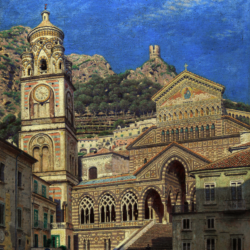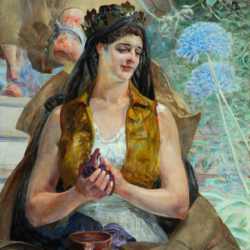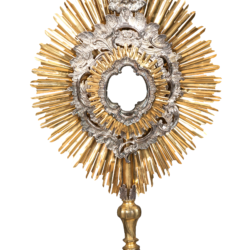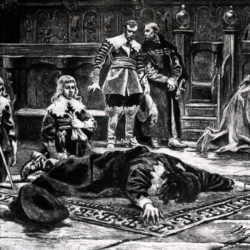
Sienkiewicz, crisis and restoration
Sienkiewicz’s historical novels are always stories of the state, how it functions, its crisis and the restoration of political order which is possible to maintain only through “Divine auxilia” (The Deluge).[1] The political crisis can be overcome by turning to faith and Christian ethics as the last sentence of With Fire and Sword (Ogniem i mieczem) already ascertains: “Hatred grew into the hearts and poisoned the blood of brothers,” and nobody chanted “Gloria in excelsis Deo.” The apocalyptic-evangelical framework that supports the narration of With Fire and Sword indicates the importance of the theological roots of the notion of political order. Christian ethical guidelines ensue from the tales of Chreptiów as told by Mr. Muszalski and Father Kamiński. I shall not provide any more examples to back the hypothesis as they substantially permeate the structure and historiosophical thought of the Trilogy.[2]
At present, I intend to focus on the most important point in Sienkiewicz’s writings which is the description of the defense of the Jasna Góra monastery. Zadencka very precisely extricates the significance of this theme:
The state organization model in The Deluge is developed through depicting it in two diametrically opposing executions: the utmost ineffectiveness and the total mobilization structured around the explicitly marked “axis” which is the “miraculous” event: the defense of the Jasna Góra monastery.[3]
This description has a modern function: it is aimed at the reintegration and regeneration of the Polish community after the defeat of the January Rising and the traumatic 1870s, the years of martial law in the Congress Kingdom and other spiritual and political losses.[4] And it is known from the research on the reception of Sienkiewicz’s oeuvre that this climactic moment of the novel played that exact fortifying role. What is more, the Jasna Góra scenes in Jerzy Hoffman’s film adaptation provided an equally strong reinforcement even in the communist era.
The modernity of Sienkiewicz’s approach lies in the creation and prefiguring of a democratic community on which the National Democratic party, in favor of the emancipation of peasants, would start organic work. Before the more secularly minded nationalists such as Jan Ludwik Popławski or Roman Dmowski understood it, Sienkiewicz had sensed with his artistic intuition that such emancipation and citizenization could take place only thanks to the religious power of Catholicism and Marian worship. In The Deluge, the writer consistently stresses the contribution of the peasants in the fight against the Swedes and their attachment to the king, which results in the Lviv Oath.[5] Social differences melt away in the face of the miraculousness of the Jasna Góra painting and one modern, unified nation emerges, a new political organism:
From the gates of the fortress, peasants, and nobles, villagers from various neighborhoods, people of every age, of both sexes, of all ranks, pressed forward to the church on their knees […]. Differences of rank disappeared: the coat of the peasant touched the robe of the noble, the jacket of the soldier the yellow coat of the artisan.[6]
The kairos time of the novel radiates with its transcendental power into the modern time, it fills the community with vitality, new life, and gradually generates anticipation of a change of fate, a miraculous event, which did eventually occur in 1918.
Przypisy
- H. Sienkiewicz, Potop [The Deluge], ch. 13, p. 232; trans. Jeremiah Curtin.
- See A. Stoff, Opowieści chreptiowskie w planie kompozycyjnym i ideowym „Pana Wołodyjowskiego” [The tales of Chreptiów in the composition and ideas of Fire in the Steppe], in Jeszcze o „Trylogii” [More on the Trilogy], Radom 2004, pp. 95–143.
- M. Zadecka, op. cit., p. 46; trans. K. C.
- See M. Płachecki, op. cit., pp. 233–238.
- Nota bene, this democratic tendency of The Deluge was initially unnoticed and slightly misinterpreted by the national democrat society newly forming around the Głos journal founded in 1886. See E. Siwiński, “Kilka uwag o “Potopie” p. Sienkiewicza” [Notes on The Deluge], Głos 1886/7, December 20 (January 1), no. 1, pp. 8–9. The democratic activist from the Tomasz Teodor Jeż generation (year 1831) claimed, among others, that Sienkiewicz throughout the six volumes of the novel “never found the opportunity to even once notice the attitude of the lords towards the peasants and how strongly oppressed the simple people were by the gentry.” The reason was supposed to be the artistic temperament of the writer who was unwilling to be shorn of “the unity of coloration” but wanted to avoid a note of dissonance and maintain the “knightly harmony” of the work. Siwiński in detail analyzed the presentation and framing of the text of Jan Kazimierz’s Lviv Oath in the novel accusing the writer, quite convincingly, of manipulation. (Compare also A. Kersten, Sienkiewicz – „Potop” – historia [Sienkiewicz, The Deluge, history], Warsaw 1974, pp. 201–203). From our perspective we can see, however, that the writer was aiming, in concordance with Ernest Renan’s recommendation, to forget the gentry’s misdemeanors and simultaneously to gradually unearth the participation of the village folk element in the fight against the Swedes, thinking not so much of historical truth as modernity that needed history as a strengthening, reassuring, and building force. For the nation must know how to live in the two time dimensions: the past and the present. See M. Gloger, op. cit., pp. 38-39.
- The Deluge, vol. 1, ch. 34, p. 186’ trans. Jeremiah Curtin.











